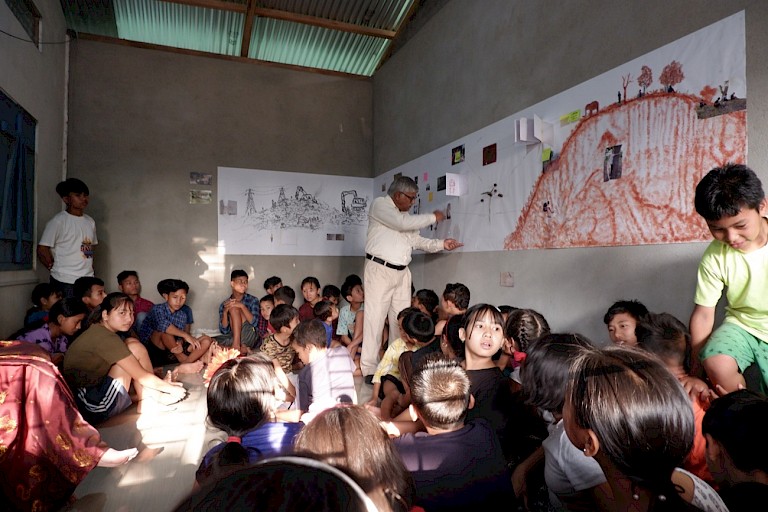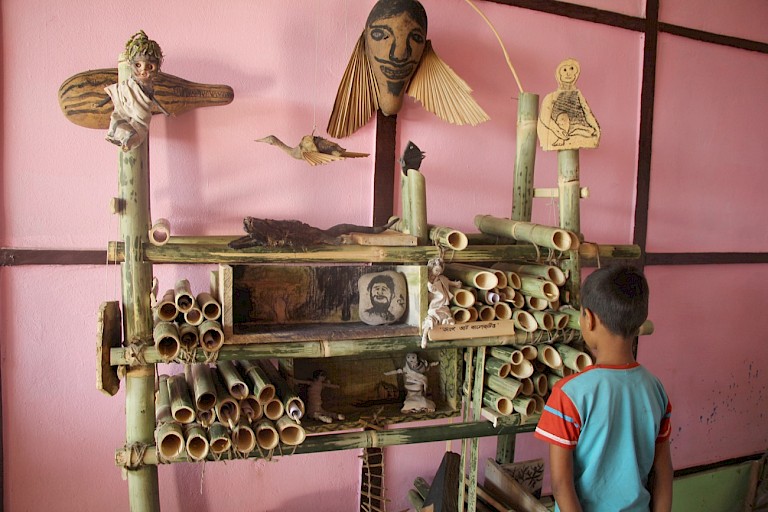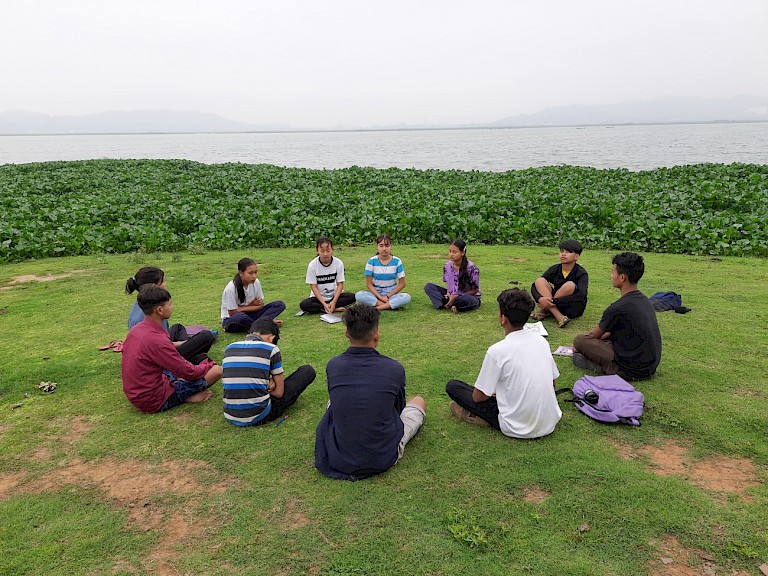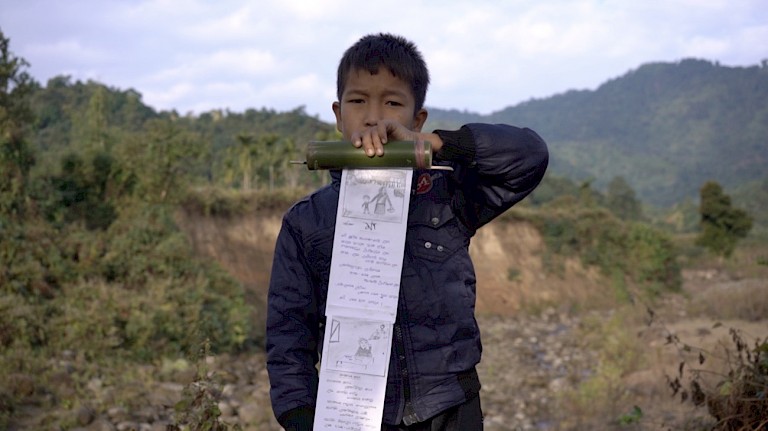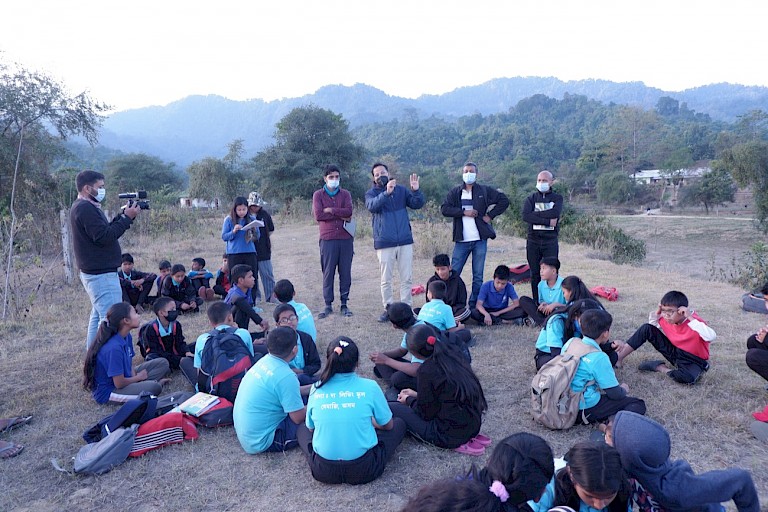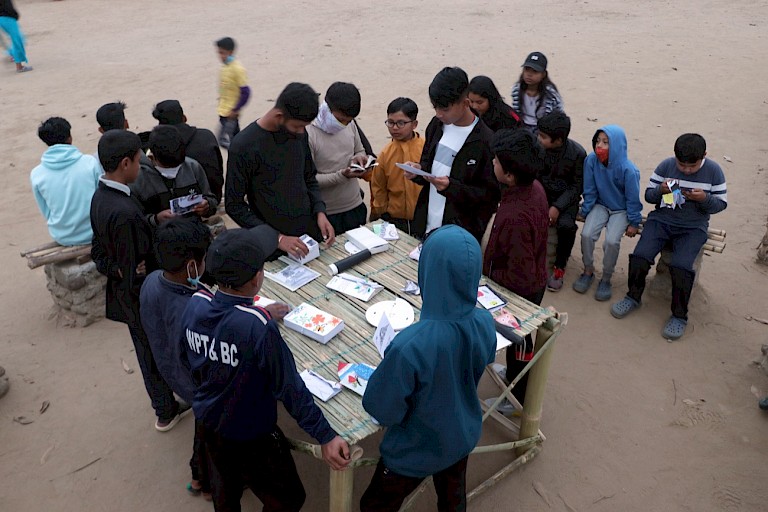



The Artist
Established in 2010, the Anga Art Collective, hailing from Assam, emerged from the vision of a tight-knit group of friends. Their mission was to cultivate a space that not only contemplated the visual and material aspects, but one deeply rooted in the geographical and social tapestry of the region. The collective distinguishes itself by its dedication to dissecting the nuances of regional and cultural idiosyncrasies, seeking to unearth artistic expressions that resonate with these unique traits.
They challenge the conventional notion of a studio, envisioning it as a dynamic process rather than a static entity. This ethos extends to their collective, viewing it as an ever-evolving organism rather than a closed ensemble. Within their ranks, a seamless blend of individual and collaborative practices thrives, emphasizing the power of synergy.
Moreover, the collective is committed to disseminating knowledge across diverse disciplines, fostering collaborations with local communities, scholars, and advocates. Presently comprising 13 members, including individuals residing both within and beyond the borders of Assam, the Anga Art Collective continues to be a testament to the enduring power of creative exploration rooted in a sense of place and belonging. The members include Bidyut Sagar Baruah, Chandan Borgohain, Dharmendra Prasad, Dhrubajit Sarma, Himadri Dutta, Kartik Lahkar, Kuldip Sarma, Mayur Rajbongshi, Pallov Saikia, Pankaj Sarma, Rahul Lahon, Sanjib Kalita, and Ankan Dutta.
In 2010, the Anga Art Collective emerged as a powerful response to the deeply ingrained colonial pedagogy that had taken root in the conventional art schools of Assam. Comprising a dedicated cohort of art students, their collective purpose was nothing short of revolutionary: to initiate a process of decolonization that would permeate both thought and artistic creation. From its very inception, the collective embarked on a mission to forge profound connections with a diverse spectrum of communities. These ranged from the riverside dwellers, to forest communities, and village inhabitants.
In their relentless pursuit of meaningful exchange, they engaged with folk artists, collaborated with social scientists, and joined forces with activists, utilizing art, dialogue, exhibitions, and educational outreach initiatives as dynamic conduits for interaction.
The genesis of the Anga Art Collective can be traced to a shared dissatisfaction with the established pedagogy of their alma mater in Guwahati. Recognizing a void in critical discourse, they took matters into their own hands, securing four adjacent rooms to serve as a space for unbridled exploration. Here, they welcomed intellectuals, writers, and artists, among them notable figures like Nilmani Phookan Jr., eventually coalescing into a formidable collective.
The conceptualization of public spaces played a pivotal role in shaping their approach. This contemplation led them to recognize the inherent collective forms within communities. The birth of the kNOw School stands as a testament to this ethos, reflected in the conspicuous emphasis on 'NO' in its nomenclature. This deliberate choice symbolizes a categorical rejection of the individualistic and competitive underpinnings that often define mainstream education.
As the collective traversed the Panikhaiti, Thakurkuchi, and Chanaka villages along the banks of the Brahmaputra, a profound realization unfolded. The curriculum of the kNOw School should mirror the fluidity of the river networks that course through these landscapes. Rivers, with their perpetual flow, serve as poignant metaphors for the ever-changing dynamics of community, land, and culture. In stark contrast, the prevailing educational syllabi tend to remain static. Within the kNOw School framework, the focus shifts towards navigating diverse communities through tailored exercises, intricately aligned with the ecological and cultural nuances specific to each, addressing their knowledge systems, concerns, and aspirations.
For initiatives like kNOw School, funding is pivotal. Remarkably, the school has predominantly thrived on self-funding. Occasional assistance comes from external collaborators in logistics and accommodation, but the majority of financial needs are met by the collective members themselves. Their dedication is occasionally augmented by grants, notably from the Asia Art Archive supporting the iteration at Parijat Academy, Pamohi, Guwahati, and Pro Helvetia backing workshops at Rani Reserve Forest.
In essence, the Anga Art Collective and the kNOw School embody an unequivocal call for transformative education. They boldly challenge the inflexible structures of conventional pedagogy, offering in their stead a dynamic, community-driven approach. Through their tireless endeavors, they not only free artistic expression from the clutches of colonialism but also empower communities to reclaim their narratives. In doing so, they foster a more inclusive, responsive, and culturally enriched educational landscape throughout Assam.
The kNOw School, an innovative brainchild of the Anga Art Collective, has heralded a transformative wave in the societal fabric of Assam. Since its inception, this unconventional educational initiative has rippled through communities, leaving an indelible mark on the landscape of learning and cultural exchange.
One of kNOw School's most profound impacts lies in its ability to challenge and dismantle the entrenched colonial pedagogy that had been the bedrock of conventional art schools in Assam. By venturing beyond established curricula and teaching methodologies, it has inspired a fresh perspective on the convergence of contemporary art forms with locally available resources. This departure from the norm has empowered learners to view education as a dynamic process, tailored to the unique needs and cultural richness of their immediate environment.
Moreover, kNOw School's approach is deeply rooted in community engagement. By setting up temporary learning spaces in villages and other communal areas, it fosters a sense of shared knowledge and communal participation. Through a series of art exercises, the traditional wisdom and knowledge of these communities pertaining to their surroundings, such as rivers, landscapes, stories, and artistic expressions, are brought to the forefront. This not only validates and preserves local heritage but also encourages a sense of pride and ownership among community members.
The impact of kNOw School extends beyond the confines of the classroom. It serves as a platform for dialogue and exchange between diverse stakeholders, including folk artists, social scientists, and activists. Through art, exhibitions, dialogues, and outreach events, kNOw School fosters an environment of meaningful exchange, where ideas flow freely, transcending traditional barriers.
In a broader societal context, kNOw School challenges the prevailing notions of education as a one-size-fits-all endeavor. By tailoring its curriculum to the fluidity of river networks and the specific ecological and cultural nuances of each community, it promotes a holistic and contextually relevant approach to learning. This not only empowers individuals with practical knowledge but also instills a sense of agency and self-efficacy.
The kNOw School's impact is felt not only in the realms of education and art but also in the broader socio-cultural landscape of Assam. It stands as a beacon of inclusive, community-driven learning, providing a blueprint for reimagining education in a way that is deeply rooted in local contexts and responsive to the evolving needs of society. Through its innovative approach, kNOw School has not only decolonized education but also revitalized communities, instilling a renewed sense of cultural pride, collaboration, and empowerment.
